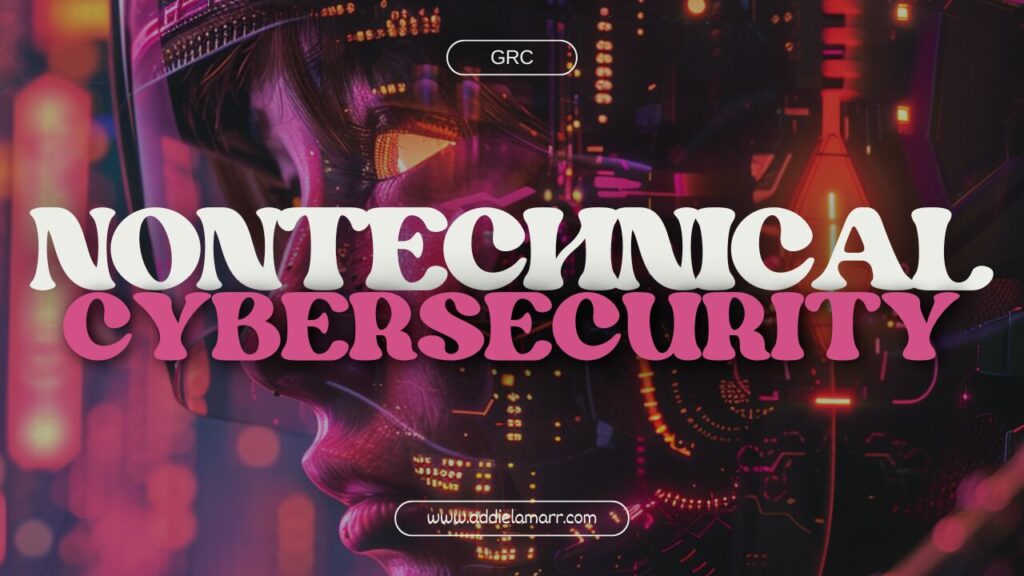If you’re considering a switch to cybersecurity but feel hesitant about the technical intricacies, Governance, Risk, and Compliance (GRC) could be the perfect entry point. Think of GRC as the strategic brain of cybersecurity. It doesn’t require you to write code or configure systems but needs you to understand and apply critical security principles to protect organizations.
What Makes GRC Unique?

GRC is like the navigator of the cybersecurity world, guiding organizations through complex regulations and risks without needing to dive into technical details. This role focuses on policies, strategies, and compliance—ensuring a company follows laws and standards to keep data safe.
The Benefits of Coming from a Different Background
Coming from a non-technical background might actually be your biggest advantage in GRC. Cybersecurity isn’t just about technology; it’s about understanding human behavior, threats, and organizational culture. Skills from fields like psychology, law, or business are incredibly valuable because they help you see the bigger picture and tackle security from a human angle.
Stepping Stone to the Industry
GRC is a fantastic way for newcomers to enter the cybersecurity field. It offers a blend of stability, good pay, and a manageable workload without the stress of technical roles. Starting salaries are often high, making it a financially appealing option for career changers. Plus, with an unemployment rate below 2%, GRC professionals are in high demand.
Why GRC Might Be Right for You
If you enjoy strategic thinking, policy, and making a significant impact without the need for deep technical skills, GRC could be your calling. It’s perfect for those who want to safeguard environments and influence how companies protect themselves from cyber threats.
ANNOUNCEMENT: I’m on the hunt for 5 cyborgs ready to make a career leap into cybersecurity. If you’re neurodivergent and eager to transform your professional path, let’s connect!
Note, you don’t have to be neurodivergent to apply!
I’m offering a FREE 30-minute career strategy session in exchange for your valuable insights as part of my market research. This is your chance to gain clarity and direction while helping shape a future that includes more voices like yours in cybersecurity.
Ready to take the next step? Click this link to apply for one of the slots.
What Do Promotions Look Like in GRC?

If you’re aiming for significant career advancement in cybersecurity, GRC is a powerful path that could lead you to top executive positions, including Chief Information Security Officer (CISO). This strategic role sets you on a leadership trajectory, distinguishing you from purely technical roles.
Progressing in Your GRC Career
As you gain experience in GRC, you’ll likely move from managing specific compliance tasks to overseeing comprehensive governance frameworks and compliance programs. With more years under your belt, you might find yourself in roles like Senior GRC Analyst, GRC Manager, or even Head of Compliance, each carrying greater responsibilities and influence over your organization’s cybersecurity strategies.
This is why my first job out of the military was such a high impact role.
Stepping into Executive Shoes
For those aspiring to reach executive levels, such as a CISO, GRC equips you with critical insights into how cybersecurity affects organizational risk and compliance. Since you’re already versed in aligning security initiatives with business objectives, stepping into a CISO role can be a natural progression.
GRC: A Launchpad for Leaders
GRC is ideal if you’re a visionary or strategic thinker who aims to impact key decisions within a company. In GRC, you shape the policies and strategies that safeguard your organization, demonstrating leadership that is essential for climbing the corporate ladder.
Leveraging Your Strategic Vision

If you excel at seeing the big picture and guiding projects more than engaging with the technical details, GRC positions you for success in management and executive roles. This career track rewards proactive planning and a keen ability to manage risks effectively.
In conclusion, starting your cybersecurity career in GRC not only prepares you for complex security challenges but also positions you for leadership roles that shape the future of cybersecurity in any organization. It’s a path that turns strategic insight into executive leadership, setting you up to be a key decision-maker in your field.
Frequently Asked Questions About GRC
What exactly does someone in GRC do?
A GRC professional focuses on governance, ensuring that cybersecurity efforts align with business goals; risk management, identifying and mitigating potential security threats; and compliance, ensuring all practices meet legal and regulatory standards.
Do I need to know how to code to get into cybersecurity or succeed in GRC?
Not at all. In my 14 years working in GRC roles within cybersecurity, I’ve never once needed to know how to code. Understanding the core principles of cybersecurity is important, but GRC focuses on applying these principles strategically rather than technically. With the right training and certifications, you can gain the necessary knowledge and skills to excel in GRC without any coding expertise. This makes GRC an excellent pathway for those interested in cybersecurity but prefer strategic and policy-oriented roles over technical tasks.
How can I start a career in GRC?
Familiarize Yourself with Basic Cybersecurity Concepts:
- Use my free cybersecurity wiki (created as a personal reference tool from my 14 year career in cybersecurity).
- Take courses or certifications like Security+.
Follow Me for More GRC Content:
- Stay updated by following my posts.
- Let me know you want to see more GRC content.
Gain Experience Without a Job:
- Check out this article for ways to get hands-on experience in GRC.
Is GRC a stressful job?
Compared to other cybersecurity roles that involve constant monitoring and technical troubleshooting, GRC is way less stressful. It requires vigilance in understanding and applying policies and regulations but doesn’t typically involve emergency or real-time threat responses.
Can GRC lead to other cybersecurity opportunities?
Absolutely! GRC provides a thorough understanding of cybersecurity frameworks and business implications, making it a great stepping stone to more technical roles or higher management positions within cybersecurity.
I highly recommend stepping into GRC.
Conclusion
If you’re interested in the intersection of cybersecurity with societal impacts and are keen on hands-on applications that focus on human aspects, consider subscribing to my weekly newsletter, Cyborg Bytes. This publication is dedicated to exploring how technology can be harnessed for self-actualization, empowering you to use cybersecurity not just as a tool for protection but as a means to enhance personal and professional life. Cyborg Bytes delves into these themes with practical insights, empowering you to apply what you learn directly to your daily interactions and long-term goals. Join us to explore how technology can transform lives by subscribing to Cyborg Bytes, where we make technology work for human benefit, fostering personal growth and self-fulfillment.




Pingback: Tough love for aspiring hackers - Script Kiddie
I want to learn it.